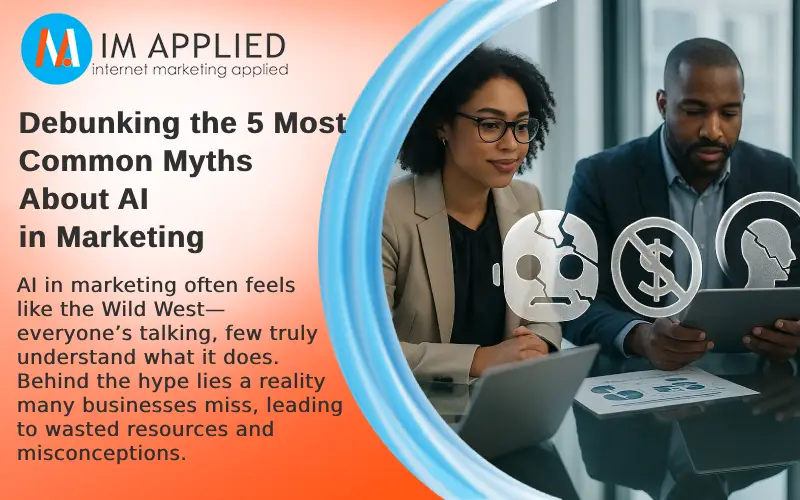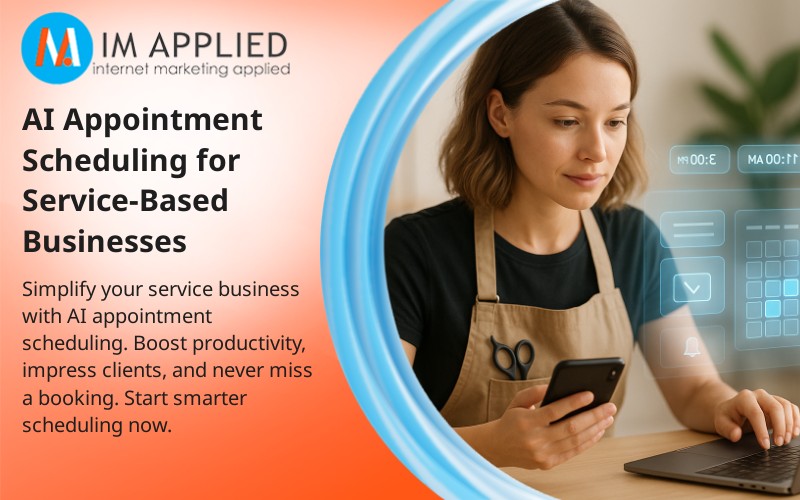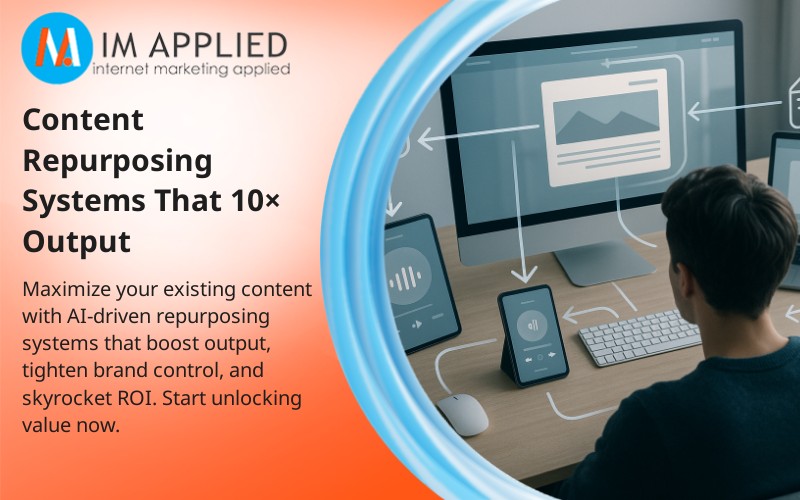Debunking the 5 Most Common Myths About AI in Marketing
Karl Marais | 17 June 2025
AI in marketing often feels like the Wild West—everyone’s talking, few truly understand what it does.
Behind the hype lies a reality many businesses miss, leading to wasted resources and misconceptions.
Let’s cut through the noise and reveal how you can strategically leverage AI’s actual potential, without falling for the most common myths.
Recognizing AI Misconceptions in Marketing
The rapid rise of artificial intelligence has spawned plenty of AI marketing myths.
These misconceptions can steer businesses toward poor decisions and missed opportunities.
It’s easy to overestimate what AI can do or get trapped in the idea that you need massive datasets or complex algorithms to see any benefit—this isn’t always true.
Often, AI marketing misconceptions arise simply from a lack of experience or being caught up in the hype.
To use AI effectively, start by debunking marketing myths and acknowledging AI limitations in marketing alongside its strengths.
Clarity empowers marketers to focus on investment in proven, practical strategies.
How Inaccurate Beliefs Spread
The spread of AI misinformation often starts with influencers exaggerating capabilities, sparking echo chambers where myths are repeated and amplified on social media and forums.
The tension between AI hype vs. reality distorts expectations, making even savvy professionals susceptible.
Understanding how AI myths start is crucial for informed strategy. Recognizing exaggerations allows marketers to skip the noise and focus on what truly works.
The Impact of Myths on Business Decisions
Relying on AI misconceptions can lead businesses to make costly errors in investment and marketing direction.
Overestimating AI—say in predicting customer behavior—wastes resources, while dismissing it outright can mean passing up meaningful ROI.
Practical, grounded perspectives yield better outcomes. For example, see our guide on setting up AI-powered lead scoring.
By separating fact from hype, marketers make smarter, more confident decisions.
1) Debunking the Myth of AI Replacing Humans
Fears that AI will replace marketers are exaggerated.
While AI automates routine work, the core of marketing, creativity, and strategy relies on human intuition and emotional intelligence.
AI and humans work best when their strengths are combined.
Automating tedious tasks lets marketers focus on big-picture thinking and innovation.
Far from eliminating jobs, AI is actually fueling new roles in the marketing world. Explore more in AI vs Human Creativity: How They Coexist in Marketing.
The Truth About AI and Job Creation
Rather than simply automating existing roles, AI is generating demand for new skill sets, creating roles for AI-savvy marketers and campaign analysts.
These professionals help organizations use AI tools to optimize messaging, analyze results, and drive innovations, making them invaluable as the field evolves.
AI as a Support Tool for Marketers
AI is a support tool, not a competitor.
It boosts productivity by handling repetitive processes, like campaign automation or social media scheduling, and delivers actionable insights from data far faster than manual methods.
For practical, accessible tools, see our list of no-code AI tools.
2) Addressing the Cost Misconception of AI
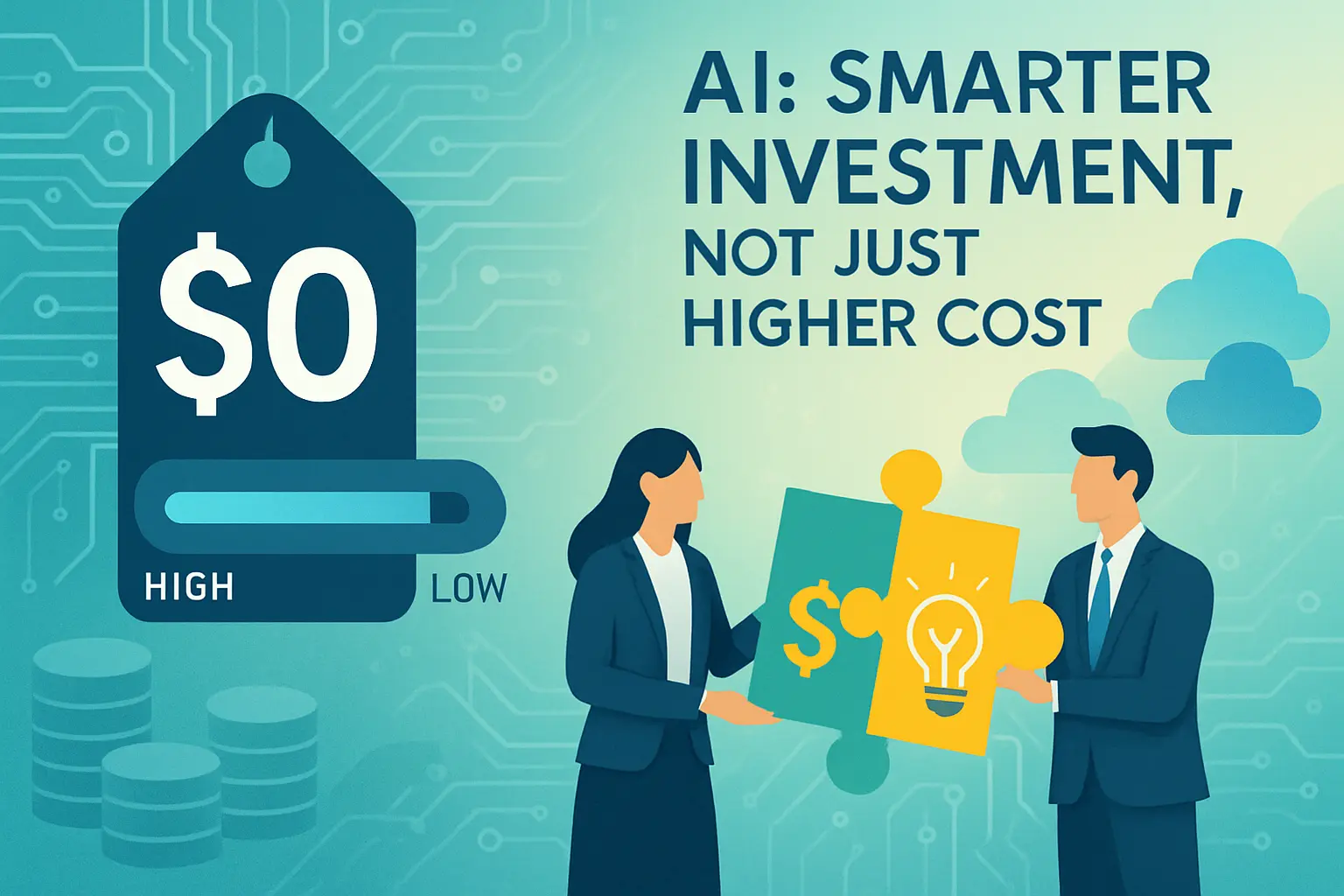
Many companies hesitate to adopt AI for fear of high costs.
The truth? AI for marketing is more affordable and scalable than ever, with many options designed for smaller budgets and non-technical users.
These days, there are plenty of low-cost AI solutions and open-source platforms, making AI accessible to even small businesses and startups.
Free or inexpensive AI tools can help organizations get started and prove ROI before bigger investments are needed.
Long-term Savings with AI Implementation
While some AI solutions require upfront investment, the long-term savings are substantial.
AI increases efficiency by automating tasks and improving targeting, leading to more conversions and lower ongoing marketing costs.
Companies experience better ROI, optimized spending, and enhanced engagement, which justifies the initial costs.
3) The Fallacy of AI and Loss of Creativity
One persistent myth is that AI stifles creativity.
In practice, AI enables creativity, suggesting ideas, surfacing trends, and freeing teams from manual drudgery so they can focus on strategy and design.
Think of AI as a creative partner: It uncovers customer insights for more personalized campaigns, recommends content ideas, and streamlines design processes with smart templates and visual suggestions.
For more, explore how AI enhances human creativity.
Enhancing Human Creativity with AI
AI doesn’t replace the human touch—it amplifies it.
Marketers get instant feedback and inspiration, as well as tools for delivering targeted, personalized experiences at scale.
This partnership delivers richer outcomes and saves time.
4) Evaluating AI Security Concerns

Security and privacy are top concerns with AI in marketing, data breaches, AI ethics, and compliance with regulations.
Responsible AI use means implementing robust safeguards and transparent practices.
Effective Strategies to Ensure AI Security
Adopt protocols like data encryption, regular audits, and proactive risk management.
Ensure AI security is integrated from the start, not retrofitted as an afterthought. Align your efforts with data protection frameworks for best results.
Understanding Data Privacy Measures
Compliance (like GDPR) demands transparent AI usage and strict anonymization of user data.
Proper data governance and clear policies build and maintain consumer trust. For more, read our examination of AI ethics in marketing.
5) Refuting the Science Fiction Narrative of AI
Pop culture often portrays AI as superintelligent beings.
Real-world AI, however, is focused and task-specific: optimizing campaigns, analyzing data, and improving personalization, not replacing strategic thinkers.
AI’s real value is in pattern recognition and data analysis, not autonomous decision-making. For deeper insights, see how AI predicts consumer behavior.
Current Real-World Applications of AI
Today’s AI powers smarter segmentation, trend prediction, personalized content, and real-time customer engagement through chatbots, predictive analytics, and email automation.
The practical applications are wide and growing.
Common Use of AI in Marketing
Businesses use AI to tailor ads and offers, optimize inventory and campaigns, and elevate customer experiences.
These benefits, once exclusive to big brands, are now within reach of small businesses, too. Learn how small firms benefit from AI.
Why Small Businesses Should Not Fear AI
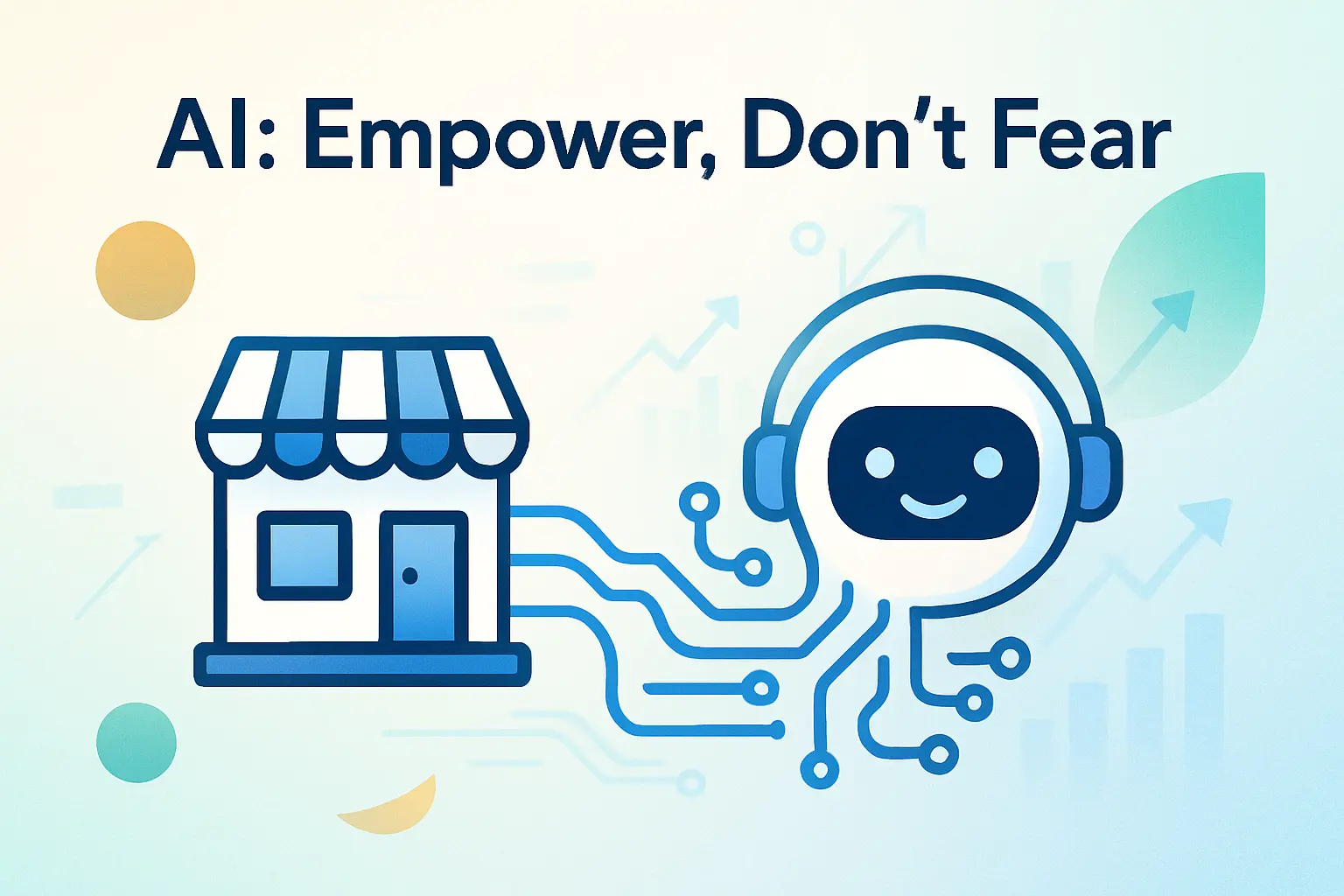
AI opens huge doors for small businesses—better targeting, smarter insights, and time savings—without overwhelming cost or complexity.
Tailored AI Tools for SMEs
Today’s AI tools for small businesses are intuitive, budget-friendly, and don’t require coding skills.
They help SMEs stay nimble, moving quickly from insights to action. Explore no-risk options like free AI tools to get started.
Overcoming Barriers to AI Adoption
Implementation needn’t be daunting.
Many platforms offer training and step-by-step resources so small businesses can integrate AI at their own pace and comfort level.
Embracing AI for Future Growth
Understanding and defining your AI strategy isn’t optional anymore; it’s essential for future-ready marketing.
AI is reshaping every part of the customer journey, from segmentation to automation to personalization.
The Evolving Role of AI in Marketing Strategies
Marketers now rely on AI for hyper-targeted campaigns, predictive decision-making, and real-time personalization.
Staying competitive means embracing these new technologies and exploring strategies for AI-driven customer journeys.
Preparing Your Team for AI Integration
Training is vital. Help your team develop AI skills and confidence through ongoing learning and accessible tools.
This investment ensures smooth transitions and unlocks new levels of efficiency and innovation.
Learn more about the benefits of AI-driven marketing automation.
In summary: The real promise of AI in marketing isn’t found in myths, but in its practical, scalable, and supportive capabilities.
By separating hype from reality, marketers can unlock AI’s strongest benefits, regardless of their business size or budget.

